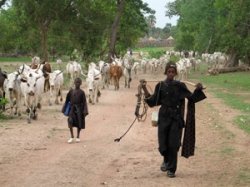Frequent clashes between locals and foreign cattle-herdsmen in many communities of the country, and local authorities’ struggle to contain livestock that stray onto the streets of the capital, have led to calls by stakeholders for the passage of a ranching law
President John Dramani Mahama, at a recent Evening Encounter organised by the Institute of Economic Affairs (IEA), indicated that a team from the Ministry of Food and Agriculture will soon be sent to study the ranching law that Burkina Faso has successfully implemented.
He noted that the passage of a ranching law in that country has forced the Fulani herdsmen to migrate down south. This has raised conservation, security and safety concerns.
A ranching law prescribes that areas which will be utilised for breeding wild animals in captivity or semi-captivity must be fenced. Animals will not be subject to the restrictions established for hunting and are declared to be the property of the breeder. Ranchers would also be required to obtain a licence from local authorities for their business.
In recent times, activities of foreign cattle-herdsmen who drive their herds through farming communities causing damage to crops and properties -- and in some instances engage in violent clashes with local folks -- has made it necessary to enact legislation that governs animal rearing and breeding in the country.
The Ashanti Regional Security Council (REGSEC) in August this year gave recalcitrant Fulani herdsmen in Agogo a month to vacate the region or face what it called “full-scale forcible eviction”.
The decision by REGSEC follows the setting-up of an 11-member committee in February to investigate the Agogo Fulani issue, following the High Court ruling that ordered the council “to take immediate, decisive, efficacious and efficient action to flush out all cattle from Aberewapong, Mankala, Nyamebekyere, Kowereso, Adomemu, Bebuoso and Brahabebome all in the Agogo Traditional Area, the only exception being cattle that have been properly confined in a permitted area.”
Most of the local cattle owners also did not have valid titles to land for their cattle business.
Livestock -- Cattle, sheep and goat -- rearing and breeding are important contributors to food availability and income in rural communities. However, due to the benefit of rearing these animals, it is important for any applicable legal framework to take both concerns into account and strike a balance between the encouragement of these initiatives and conservation, security and local concerns.
In Burkina Faso, Ghana’s northern neighbour, both game-ranching and breeding are subject to an authorisation. Within ranches, wildlife populations are to be monitored either by the rancher or by the wildlife administration, with a view to rational management of captures.
A licence is also required in Cameroon for both game-ranches -- protected areas managed for the purpose of repopulation and possible exploitation for food or other purposes and for game-farming -- and raising of animals taken from the wild in a controlled environment for commercial purposes. In Botswana “permission” is required to farm or ranch game animals. Fencing may be required.
"Protected" and "partially protected" game animals may be farmed or ranched only under a specific authorisation. If the area is fenced, there is no limit to the number of animals of specified species which may be taken. Otherwise, culling is subject to a permit. A permit is also required for sale of animals, meat or trophies.
Though government is yet to send a delegation to Burkina Faso to study their law, stakeholders believe that with the passage of legislation to govern livestock rearing and breeding, the unfettered activities of Fulani herdsmen and individual livestock owners will be well-regulated.
Business News of Monday, 26 November 2012
Source: thebftonline
Ranching law needed













